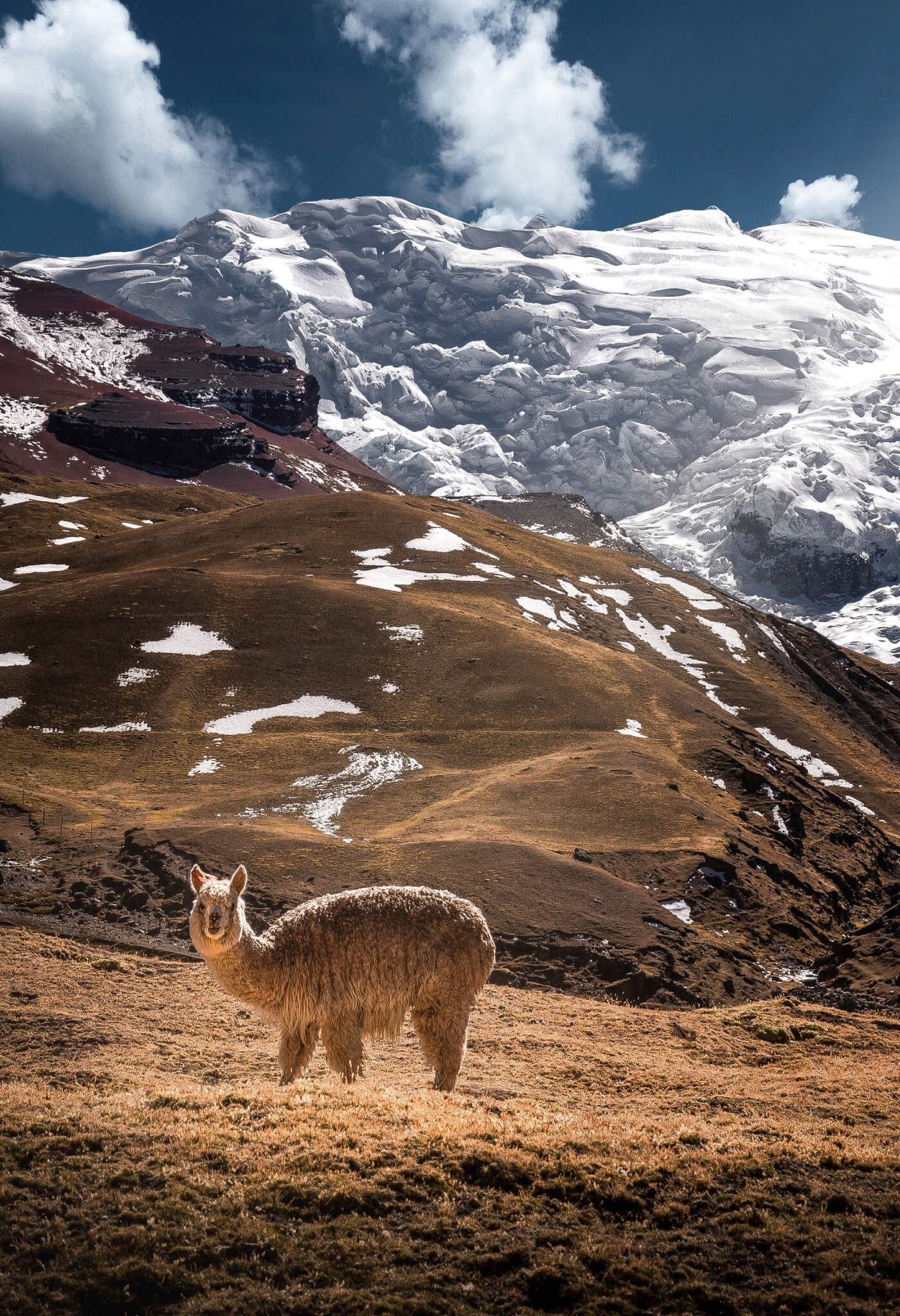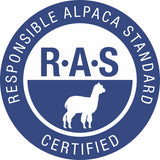
Shipping & Returns
INSIGHT
Manufacturing in Peru





WITHOUT HARMFUL SUBSTANCES
environmentally friendly production

ANIMAL WELFARE
in breeding & wool production

FAIR-TRADE
Fair pay & working conditions
Frequently asked questions about alpaca scarves for women
Are alpaca scarves soft and gentle on the skin?
For women, it is particularly important that scarves are soft and comfortable to wear. The softest alpaca wool is baby alpaca . It is rare and more expensive because it can only be obtained from protected areas of the alpaca's body. Alpaca wool can be scratchy in the lower qualities of alpaca, fine and superfine. Baby alpaca, on the other hand, is as soft as cashmere and is even suitable for allergy sufferers.
Are alpaca scarves warm?
As the warmest wool in the world, alpaca wool is ideal for warm scarves. With thick winter scarves, you should make sure that they are tightly woven and contain enough wool. Thinner alpaca scarves are not as warm and are suitable for the transitional months. Alpaca wool adapts to the temperature and keeps you pleasantly warm on the one hand, but doesn't make you sweat on the other.
How do I recognize a high-quality alpaca scarf?
With wool, quality comes from purity. In scarves with a low alpaca content of only 10 - 50%, the alpaca wool is less able to develop its warmth and softness. Alpaca scarves made from 100% baby alpaca, on the other hand, make full use of the advantages of alpaca wool.
Are alpaca scarves sustainable and environmentally friendly?
Alpaca wool is part of sustainable slow fashion and is a premium niche in the clothing segment. Alpacas are landscape-friendly animals that protect pastures with their soft paw pads and their eating habits. Alpaca wool is a biodegradable natural fiber and is durable, and the intense colors of the alpaca camels often mean that chemical dyeing is not necessary.
How do I recognize wool without animal cruelty in alpaca scarves?
To be sure that your women's scarf made of alpaca wool is free from animal cruelty, you should look for animal welfare certificates such as Responsible Alpaca Standard (RAS). We only use RAS-certified wool to offer buyers better guidance.
How do I wash my alpaca scarf properly?
Alpaca scarves are easy to care for and can be washed in the washing machine or by hand. When machine washing, it is important to use the gentle wool program with a low temperature and spin speed and to add wool detergent. Alpaca fibers are robust and do not lose their shape and softness even after frequent washing.
Alpaca scarves for women as a luxurious accessory
Alpaca wool comes from alpacas that live in the Andes of South America and have been bred for their valuable wool for thousands of years. They owe their special wool to their descent from wild vicuñas. Vicuna wool is the most expensive wool in the world and is only offered by a few fashion brands. Softness and warmth are particularly important to women when it comes to scarves. No wool is better suited to soft scarves than alpaca wool. Cashmere is just as soft as baby alpaca but less warm and merino is almost as warm as alpaca wool but generally less soft.
With us you will find plain and patterned scarves, scarves with fringes and also fine blends such as alpaca silk wool. Elegance and maximum comfort are the signature of our collection of alpaca scarves for women from Peru, the land of the alpacas with the largest alpaca population in the world. Longer scarves can be wrapped around your neck several times and keep you warmer, while shorter scarves are often the accessory that completes your outfit. If you are looking for a scarf for evening events, we can recommend our alpaca stoles, as larger shoulder scarves. Our cream-colored stoles are particulary popular for weddings, made from 100% baby alpaca or mixed with silk.
Das macht Schals aus Alpakawolle so besonders
Alpakawolle verzaubert vom ersten Moment an. Neben ihrem Tragekomfort bietet sie weitere Besonderheiten, für die sie qualitätsbewusste Menschen schätzen.
Weichheit & Wärme
Babyalpaka ist die weichste Alpakawolle. Sie ist weich wie Kaschmir und hält dich gleichzeitig angenehm warm. Dicke Alpaka Schals eignen sich hervorragend für den Winter, während du bei dünnen Schals aus Alpakawolle von der Thermoeigenschaft profitierst. Alpaka Fasern sind innen hohl und halten dich warm oder wirken kühlend-isolierend, je nach
Witterungsbedingung.
Atmungsaktiv & sanft zur Haut
Wichtig bei hautnahen Textilien wie Alpaka Schals für Damen ist es, dass sie atmungsaktiv sind und Feuchtigkeit ableiten. Alpakawolle und auch Merino bieten diese Eigenschaft, sodass dein Hals auch bei körperlicher Betätigung trocken und geruchfrei bleibt. Sie ist so hautschonend, dass sich Alpakawolle auch für Allergiker eignet. Das Fell von Alpakas enthält von Natur aus kaum Lanolin (Wollfett) und ist deshalb bei Wollallergikern und Neurodermitikern besonders beliebt.
Chemikalien-frei
Unsere Alpaka Schals für Damen in den Farben creme, grau, braun und schwarz sind die Naturfarben der Andenkamele. Der chemische Färbungsprozess entfällt komplett und auch generell kann man die feinen Alpaka Fasern nur schwer mit Chemikalien behandeln. Deine Haut wird es dir danken.
Edler Glanz
Eine weitere besondere Eigenschaft von Alpakawolle ist ihr natürlicher Glanz. Neben der Weichheit ist der seidige Glanz der zweite Aspekt, der Frauen bei Alpakawolle begeistert.
Strapazierfähig & leichtgewichtig
Alpakawolle ist robust und verliert auch nach vielen Jahren ihre Form und Weichheit nicht, auch nicht nach häufigem Waschen. Dass sie leicht im Gewicht ist, erhöht, insbesondere bei dicken Winterschals, den Tragekomfort. Alpaka Wolle waschen kannst du ruhigen Gewissens seltener, da sie bakterienhemmende Moleküle enthält, die verhindern, dass sich schlechte Gerüche festsetzen. Anders als Kaschmir neigt Alpakawolle kaum zu lästigen Pilling Knötchen, die die Optik deines eleganten Schals schnell beeinträchtigen würden.
Pflegetipps: Damen Alpaka Schal waschen
Alpakawolle lüftet an der frischen Luft gut aus, weshalb es seltener notwendig ist Alpaka Schals zu waschen. Wenn es so weit ist kannst du sie per Handwäsche oder im Wollprogramm der Waschmaschine reinigen. Achte dabei auf eine maximale Temperatur von 30 Grad Celsius und eine Schleuderzahl von nicht mehr als 600 Umdrehungen pro Minute. Auf Weichspüler und Bleichmittel verzichten, stattdessen Wollwaschmittel hinzugeben und den Alpaka Schal mit einem Wäschenetz zusätzlich vor Reibung in der Trommel schützen. Alpaka Schals nicht in den Trockner geben oder bügeln, sondern liegend lufttrocknen lassen.














































































